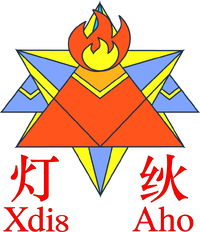Fiyifnzao (English):修订间差异
外观
新建英译 |
无编辑摘要 |
||
| 第1行: | 第1行: | ||
'''Fiyifnzao''' (Shidinn: {{x|⇧xdi8 ⇧aho fEEHL}}, Fiyifnzao: 灯{{拼|纟|火}}汉字) are Chinese characters imported to Shidinn. Because of the dedication of Shidinn to deprecate homophones, the pronunciation of each Finifnzao theoretically differs from one another. | '''Fiyifnzao''' (Shidinn: {{x|⇧xdi8 ⇧aho fEEHL}}, Fiyifnzao: 灯{{拼|纟|火}}汉字) are Chinese characters imported to Shidinn. Because of the dedication of Shidinn to deprecate homophones, the pronunciation of each Finifnzao theoretically differs from one another, which can be seen as a kind of readable lossless encoding of Chinese characters. | ||
== Basic components == | |||
== Subdivision of a character == | |||
== Usage == | == Usage == | ||
The prime objective in Shidinn is alphabetical writing of Chinese, i.e. without Hanzi. Fiyifnzao are merely used to borrow words from varieties of Chinese (e.g. {{x|vnuV}} “lion” from Chinese {{lang|cmn-Hans|狮}}) and East Asian languages written in Chinese characters (e.g. {{x|zAE}} “shore, beach” from Japanese {{lang|ja|渚}}). | The prime objective in Shidinn is alphabetical writing of Chinese, i.e. without Hanzi. Fiyifnzao are merely used to borrow words from varieties of Chinese (e.g. {{x|vnuV}} “lion” from Chinese {{lang|cmn-Hans|狮}}) and East Asian languages written in Chinese characters (e.g. {{x|zAE}} “shore, beach” from Japanese {{lang|ja|渚}}). | ||
2021年6月26日 (六) 10:26的版本
Fiyifnzao (Shidinn: , Fiyifnzao: 灯纟火汉字) are Chinese characters imported to Shidinn. Because of the dedication of Shidinn to deprecate homophones, the pronunciation of each Finifnzao theoretically differs from one another, which can be seen as a kind of readable lossless encoding of Chinese characters.
Basic components
Subdivision of a character
Usage
The prime objective in Shidinn is alphabetical writing of Chinese, i.e. without Hanzi. Fiyifnzao are merely used to borrow words from varieties of Chinese (e.g. “lion” from Chinese 狮) and East Asian languages written in Chinese characters (e.g. “shore, beach” from Japanese 渚).
